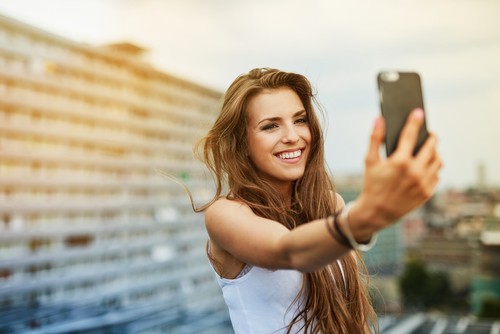
Snapping selfies may be negatively affecting self-esteem, because while smartphone cameras are relatively advanced, the images they produce distort how you look, according to researchers at Rutgers University.
The researchers are concerned that this distortion may be causing people to see flaws that are not there.
Scientists from Rutgers New Jersey Medical School and Stanford University in California collaborated to understand how selfies can distort your image.
Their project found that selfies taken 12 inches from the face can make the tip of the nose appear 7 percent wider on average than in real life.
The base of the nose also appeared 30 percent wider in an image taken from 12 inches away than one taken from 5 feet away.
Five feet is a standard distance for portrait photographs.
The Rutgers researchers claim the effects of close-up selfies are like those of a “funhouse mirror.”
To determine the best distance for a selfie, the study authors created models of the average male and female face made up of several parallel planes. They determined the “average” face by using random photo samples collected from ethnically and racially different participants around the United States.
After creating the models, the researchers were able to find out relative distortion of facial features when a camera was at 12 inches, 5 feet or an infinite distance away from the facial models.
This is when the researchers found that the hyper-close proximity of selfies distorts facial features.
This distortion is causing many individuals to seek out plastic surgery procedures to fix perceived flaws created by selfies. A study by the American Academy of Facial Plastic and Reconstructive Surgery showed that its member plastic surgeons saw an increased number of patients seeking out facial plastic surgery because they wanted to improve their image for selfies.
The 2014 study also found that nearly 60 percent of patients seeking facial procedures were under the age of 30.
The AAFPRS polled its members recently and found that in 2017, 55 percent of its members saw patients who wanted to improve their look for selfies.
This news is not surprising to Dr. Jack Peterson, a Topeka plastic surgeon.
“If you have always thought your nose was too wide, and you start taking selfies, and those selfies distort your nose and make it look 30 percent wider, then you may start to really think your nose is out of proportion to the rest of your face. Over time, this will make you want to do something about it,” Peterson said.
This situation can cause some individuals to become self-conscious about their appearance.
An increased risk of developing a complex or feelings of embarrassment over a distorted feature was a motivation for the Rutgers researchers to conduct the study. Study authors were concerned with the growing number of individuals seeking surgical solutions for features that were not distorted.
“While selfies can distort features, plenty of people still seek out surgical procedures to fix facial features or body areas because they sincerely want change,” Peterson said.
Plenty of people is right.
Statistics from the American Society of Plastics Surgeons show that there were 17.5 million facial and body procedures performed in the U.S. in 2017, a 2 percent increase over the previous year.
The ASPS numbers also show increased demand for minimally invasive or noninvasive procedures such as dermal fillers, Botox, chemical peels and microdermabrasion.
Cellulite-reduction treatments increased by 20 percent between 2016 and 2017, as well.
The increased demand for nonsurgical procedure has been driven by patient demand for faster treatments and less recovery times.
“People not only want to look good, they want to look good quickly,” Peterson said.
Source:
Live Science. Selfies Distort Your Face by 30% — And Here’s the Math to Back It Up. 1 March 2018

